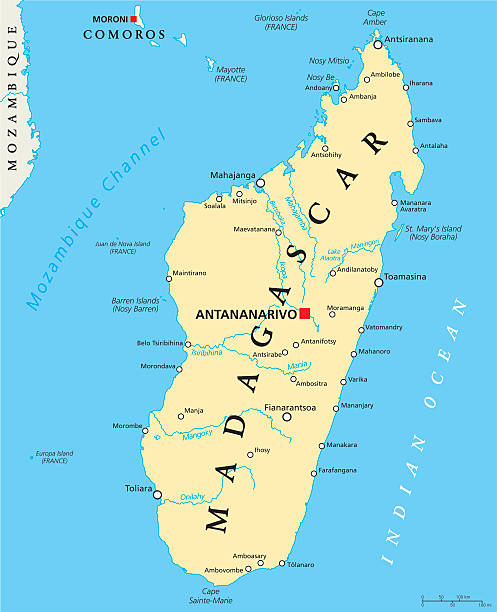Madagascar is the fourth largest island in the world and the largest in Africa. It is also a sovereign state that attained independence from France in 1960. It has a young population of 29 million.
Madagascar is located some 400 km (250 miles) off the coast of South-eastern Africa across the Mozambique Channel. It is surrounded by the Indian Ocean and several small satellite islands. Even though the country is surrounded by water, it has some immediate neighbours. Mozambique, the Comoros, Seychelles and Mauritius are the closest states to Madagascar.
Historically, Madagascar has been influenced by the African, Arab and Asian cultures. Genetically, however, the people are predominantly of Asian origin. While many have attempted to explain the historical mode of migration to the island from Asia, there has not been a consensus.
The recent politics of Madagascar has been one of chaos between political traditions and personalities. Since 2018, however, the country has seen some stability. While the continent has seen the return of coup d’états, especially in West Africa, Madagascar has not experienced many coups. There has been a single successful coup since independence.
The economy of the island grew at 4.2 per cent in 2022 according to the African Development Bank (AfDA) with inflation reaching 8.1 per cent. The total GDP was around $15 billion. The 2022 growth in GDP was a fall from an impressive 5.7 per cent in 2021. This notwithstanding, the country’s debt to GDP is moderate. At 57%, it is better than many African countries including Ghana. It is expected that the economy will maintain 4.2% in respect of its expansion in 2023 and shoot up to 5.0% in 2024. It is anticipated that growth in the coming years will be driven by the mining sector.
The rich arable land of the island makes it good for raising animals. In terms of mineral resources and precious stones, the country has significant deposits of several of them including bauxite, iron ore, sapphire, chromite, gold and rare earth elements.
The country has many faunas and flora that are not found in any other place in mainland Africa. Biologists and botanists keep studying the unique ecosystem of the island. The country increasingly faces environmental degradation as the growing population requires extra space for social and economic activities.
Geopolitically, Madagascar, despite being separated by the Mozambican Channel, is a member state of the Southern African Development Community, SADC. It is also an active member of the African Union.
Security issues:
While Madagascar has not had violent attacks from international terrorists, political tensions have become relatively violent in recent times. In 2023, pre-election campaigning and dynamics have heightened tensions and led to violent clashes some deaths have been reported from the macabre clashes.
The country also faces the worsening effects of climate change as devastating cyclones are becoming common. On the other hand, parts of the Face record droughts that are threatening to create a humanitarian crisis.
Verdict:
Despite the plethora of challenges facing the island, it has huge potential, especially in the mining sector. With efficient management and investor-friendly policies, Madagascar could take advantage of its strategic location in the Indian Ocean and the promising tourism sector to advance its economy.
Furthermore, the country needs to invest in its education and health sectors. For long-term stability, inclusiveness and institutionalism must be encouraged. Risk is at medium levels.
image source: istock
